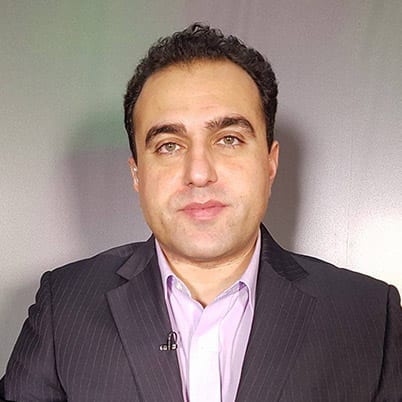This year’s Quds (Jerusalem) Day in Iran was staged with greater fanfare than ever, not least because of rising tensions with Israel. Last month Israel claimed to have staged air strikes against the entire Iranian establishment in Syria.
The air strikes of early May – widely judged to have been the most significant Israeli air assault on Syrian territory since the early 1980s – came on the heels of escalating tit-for-tat strikes involving Israel and the Iran-led alliance in Syria.
In April Israel struck the T4 air base in Homs province, home to the Islamic Revolutionary Guards Corps (IRGC) aerospace division in Syria. Seven members of the IRGC were reportedly killed in the strike on T4, amongst them allegedly the commander of the Revolutionary Guards’ drone force in Syria.
The assault on T4 was interpreted in Tehran as a deliberate and highly calculated attack on the heart of the IRGC’s operations in Syria, a provocation which necessitated a meaningful Iranian response. This came in the form of a rocket barrage aimed at the Israeli military in the occupied Golan Heights, which in turn led to the Israeli air strike on the IRGC establishment in Syria.
READ: Iran denies negotiating with Israel over Syria
The key question is whether these direct clashes will escalate in the months ahead, particularly in the light of the near-collapse of the Iran nuclear deal and broader US-Iranian tensions.
Annual spectacle with a twist
The annual Quds Day rallies in Iran are foremost designed to reaffirm the Islamic Republic’s anti-Zionist credentials. Innovated by the late revolutionary leader Ayatollah Ruhollah Khomeini, the demonstration is held on the last Friday of the Muslim fasting month of Ramadan.
The Quds Day rally is staged internationally, with a strong focus on Western capitals, notably London, with a view to globalising the anti-Zionist campaign. Moreover, the international focus reflects a key feature of Iranian foreign policy, namely the stated goal of “liberating” Jerusalem from the yoke of Israeli occupation.
In view of Iran’s first direct military clash with Israel, Iranian leaders and officials were understandably keen to promote the Quds Day event more vigorously both at home and abroad. This was at least partially successful with big Quds Day rallies in Baghdad and more strikingly in the Yemeni capital Sanaa.The surprisingly big Quds rally in Sanaa speaks to the ever-closer alignment of Yemen’s Ansar Allah movement – and allied forces including most of Yemen’s army – with the Islamic Republic. The diffusion of the anti-Israeli doctrine across the region is part of a broader Iranian strategy of subverting the attempt by key Arab states, notably Saudi Arabia, to normalise relations with the Jewish state.
Watching the big Quds Day rally in the Iranian capital Tehran, the most striking observation was the renewed vigour of the Islamic Republic’s anti-Zionist message. It is one of those rare moments in Iran when ideology, declared policies and strategic direction are fully aligned.
Drift toward war?
This year’s big Quds Day rally was defined by a broader and deeper strategic context. Foremost, the near-collapse of the nuclear deal – known as the Joint Comprehensive Plan of Action (JCPOA) – following US President Donald Trump’s repudiation of it has once again plunged Iranian-US relations into crisis.
Trump’s incendiary anti-Iranian rhetoric, and his close alignment with both Saudi Arabia and Israel, has understandably caused alarm in Tehran. Furthermore, the US withdrawal from the JCPOA – coupled with America’s single-minded determination to impose the “strongest sanctions in history” on Iran – presents the Islamic Republic with a set of stark strategic choices.
#QudsDay
These stark choices came into sharp relief following US secretary of state Mike Pompeo’s issuing of 12 impossible demands on Iran, including withdrawal from Syria and ending support for the Lebanese resistance group Hezbollah. Needless to say, these demands were issued to be rejected; with their real value residing in the ability to complicate Tehran’s regional strategic choices.
Even though Iranian leaders and officials have reacted relatively cautiously to Trump’s bellicose rhetoric, nonetheless it is clear that the only realistic path for Iran is to go on the offensive, both rhetorically and wherever possible on the ground across the region’s conflict zones.The strategic necessity of pushing back against aggressive and unjust US demands will inevitably affect Iran’s calculus on Israel. Before the recent direct clashes beginning in February when Israel attacked an Iranian position in Syria, Iran’s strategy was to implement its anti-Zionist ideology without coming into direct blows with the Jewish state.
READ: Syrian army boosts air defences near Golan frontier
The events of the past few months, notably the rocket attack on the occupied Golan Heights and the robust Israeli response, have changed the rules of engagement. As pressure mounts on Iran on several fronts, the temptation to attack Israel directly (in response to Israeli air strikes on Iranian or Hezbollah related targets in Syria) will be hard to resist.
However, in the final analysis, a major regional war is not imminent, not least because the Russian presence in Syria constrains the protagonists’ strategic, tactical and operational choices. Indeed, numerous reports allege that Russia and Israel have struck a deal to keep Iran and its allies away from the occupied Golan Heights, presumably with a view to preventing a major confrontation.
But this situation can change, especially as the Syrian War dies down completely and the Russian influence declines accordingly. In the long-term, the Iranian-Israeli conflict is set to redefine the strategic landscape of the region in an explosive fashion.
The views expressed in this article belong to the author and do not necessarily reflect the editorial policy of Middle East Monitor.

![Iranians protest on International Al-Quds Day in support of Palestinians in Tehran, Iran on 8 June 2018 [Fatemeh Bahrami/Anadolu Agency]](https://i0.wp.com/www.middleeastmonitor.com/wp-content/uploads/2018/06/20180608_2_30796467_34468598.jpg?fit=920%2C613&ssl=1)

![Iran Nuclear Deal or Trump protecting Israel - Cartoon [Sabaaneh/MiddleEastMonitor]](https://i0.wp.com/www.middleeastmonitor.com/wp-content/uploads/2018/05/2018_5-11-cartoon.jpg?resize=500%2C333&ssl=1)
![Nuclear Deal: Israel is behind it - Cartoon [Sabaaneh/MiddleEastMonitor]](https://i0.wp.com/www.middleeastmonitor.com/wp-content/uploads/2018/05/IMG_0701.jpg?resize=500%2C310&ssl=1)






